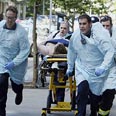
Prosecutor: Seattle Jewish center shooter was sane
Jurors told man charged with shooting, which left one woman killed and five injured, knew right from wrong, used murder to get out a message
"The cost of that message was high, and now it must be paid," prosecutor Don Raz said in his closing argument in the trial of Naveed Haq, who has pleaded not guilty by reason of insanity to murder and attempted murder.
Raz said the way Haq went about killing a woman and wounding five others at the Jewish Federation of Greater Seattle in July 2006 showed he clearly could perceive the nature of his actions and was not insane.
If jurors find he committed the crimes, they must determine whether he would spend his life behind bars without parole or locked in a mental hospital.
Before the case went to the jury Thursday afternoon, defense attorney C. Wesley Richards told jurors that Haq could not tell right from wrong and had intended to take hostages, not to kill.
"Mr. Haq had a delusional belief that by coming to the Jewish center and getting on CNN he could change the course of two wars, the wars in Iraq and Afghanistan," Richards said.
"He thought he was going to save lives. He thought he was doing God's will."
Haq walked through the Jewish center's downtown Seattle office, ranting against Israel and the Iraq war as he fired, hitting some people at their cubicles and killing Pamela Waechter as she fled down a stairwell.
Long history of mental illness
Dayna Klein dialed 911 after being shot in the arm, told an operator a man was pointing a gun at her and handed Haq the phone. He told the operator he wanted to get on CNN and soon agreed to surrender.
"We are very sorry for what happened," Naveed Haq's father, Mian, told some of the victims Thursday in a barely audible voice, hugging them after his son was escorted out of court in handcuffs.
Raz said Haq, 32, of Kennewick, planned the shooting for days before driving from his home in eastern Washington to Seattle, left a shotgun in his truck because he believed carrying it with him would draw too much attention, hid in the foyer of the center to avoid detection and picked his victims in the small office.
"He's not shooting randomly. He's hitting people and these are people he wants to control, people who have called 911 or are trying to get away," he said.
Defense attorneys cited Haq's long history of mental illness in arguing that he was insane and should be committed to a state mental hospital rather than prison. Jurors heard conflicting testimony from mental health experts.
Richards showed jurors a large, cartoonish diagram of a lit stick of dynamite to illustrate the types of pressures that Haq was under, including financial stress, a long history of mental illness and a change in medication that worsened his condition.
He spoke about Haq's history of paranoia and auditory hallucinations and said, "Ask yourself if someone with those kinds of conditions could really premeditate the shootings of five women in 20 seconds," referring to the first five victims.
Raz said the state does not dispute that Haq had a mental defect that prevented him from making friends, dating women and holding down a job, but he said Haq did have a basic understanding of the world around him and knew what he was doing.
Haq did not mention to psychiatrists the notion that he was being controlled by voices or by God until many months after the shootings.
"Imagine if your teenage son or daughter came in and said 'Mom, dad, remember when I wrecked the car 18 months ago? God was driving,'" Raz told the jurors.










